Archive: February, 2020
Debate Fail
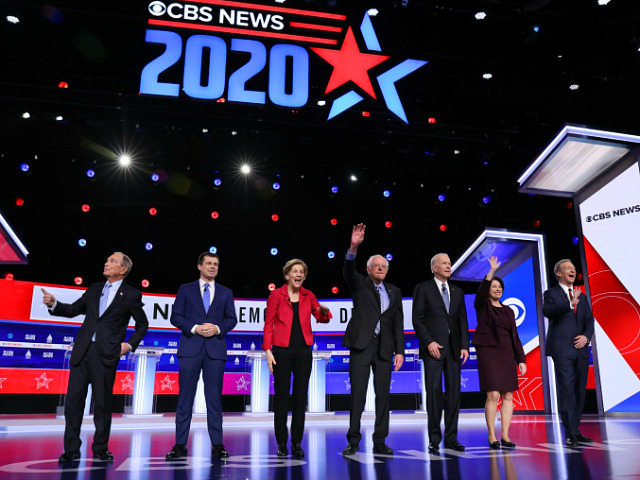
CBS: Bad at baseball, bad at debates
Well, that was embarrassing.
The latest (and last before Super Tuesday) debate in the Democratic primary campaign ended a little while ago and the most charitable thing I can say about it is that it was a mess. Candidates talking over each other, petty sniping, perhaps the worst moderator performance yet. That last is really saying something—the questions in these debates have been pretty lame, but these people, who in their day jobs aren't all that bad, were astonishingly ineffective and ass-backwards with their priorities. At least Chuck Todd wasn't involved.
Some good moments in terms of candidate answers/comments, which I'll note below, but they were ignored by moderators who allowed and even engineered pivots to nonsense and shouting. Unlike the last couple of debates, I watched this one solo and followed my Twitter feed in more-or-less real time; some solid commentary:
Dear Debate Organizers,
— It's "Mrs. Powers" during my day job. (@JenBenPowers) February 26, 2020
Perhaps you might consider having an educator moderate future debates. We have extensive experience in calling on people to speak, and not allowing others to interrupt.
Just a thought.
Sincerely,
A Kindergarten Teacher#DemDebate2020
CBS: call the bullpen, get the emergency moderator warmed up.
— Philippe Reines (@PhilippeReines) February 26, 2020
This is a human xylophone that’s gone out of tune.#DemDebate2020
— Charles P. Pierce (@CharlesPPierce) February 26, 2020
CBS screwed the pooch so badly. From dumb questions that completely ignored the most pressing issues of the day to complete lack of control over the crosstalk to steamrolling through and past the most pertinent things said by the candidates, CBS handled this in such an unprofessional manner that they should be suspended for four years from hosting national debates. And, the cherry on top, they ran at least two Bloomberg ads during the breaks. What. The. Frak.
It called to mind my feelings when CBS had the broadcast rights for Major League Baseball in the ’90s. They instituted a playoff schedule that didn't allow fans to watch games out of their immediate market and saddled us with some of the worst sportscasters of the day (looking at you, Musberger). We missed NBC and Scully and Costas so much. (Still do, since when CBS lost the rights they went to Fox. Not worse, but not much better.)
But unlike sports, a Presidential election is hugely consequential and deserves, you know, actual journalism and substantive conversation rather than reality-show bear-poking and inane repetitive dumbed-down-agenda-setting. Truly pathetic, punctuated by a last-question round more suitable for a campaign for prom king/queen and then a gratuitous commercial break to run, among others, yet another fucking Bloomberg ad.
When there was good substance, it came from Joe Biden, Elizabeth Warren, and a little from Tom Steyer. Pete Buttigieg had a couple of good answers as well, but hurt himself with some too.
Pete scored with some acknowledgment of his white privilege and recognition that neither he nor anyone else still running has the experience of being black/brown in America, as well as getting a good shot in against Bernie Sanders' support for keeping the filibuster rule—"How are we going to deliver a revolution if you won’t even support a rule change?"—but also warned that a Sanders nomination would beget "a scenario where it comes down to Donald Trump with his nostalgia for the social order of the ’50s and Bernie Sanders with a nostalgia for the revolution politics of the ’60s," denigrating a 1960s period in politics that resulted in, among other things, the Civil Rights Act, Medicare, "The Great Society," the women's lib movement, et.al, things that are very much tied to Democratic staple values. Not only will this not appeal to Sanders' supporters—a ’60s-style uprising is the point to a lot of them—it may well alienate rank-and-file Dems to diminish what came from that time of tumult.
Warren once more shivved Bloomberg for his past treatment of women and history of funding Republicans, which was welcome. She also made a strong case for public education and its importance, addressed foreign policy issues like military intervention and Middle-East conflicts with thoughtful substance and diplomatic aplomb, and most importantly made her case for being the true progressive choice by (a) pointing out that her "progressive" proposals are popular among Democrats and largely mainstream, and (b) showing her knowledge of the system and how to navigate it, something Sanders simply has not shown an ability to do. Part of that is her insistence that the Senate must do away with the filibuster, a goal Sanders opposes, as necessary to overcome Republican intransigence. I'm ambivalent about removing that tool from the box, but it has been abused so broadly and routinely by Mitch McConnel and company that I agree in principle. (I'd prefer an adjustment to the rule that returns it to the "Mr. Smith Goes to Washington" style filibuster that requires a Senator hold the floor indefinitely; still plenty of opportunity for abuse there, though, so I might be convinced even that has to go.)
Biden went to his tired routine of claiming he's the only one running who'd ever accomplished anything, which is, frankly, annoying, but he also looked strong and more together than he has in prior debates. When discussing gun violence (nice to see that brought up, by the way), he called out the NRA, which was great, while also sticking it to Sanders for his previous support of gun-lobby positions (positions which, to his credit, Sanders now admits were wrong). He also showed some foreign policy chops when hammering the Trump Administration for its myriad failures.
Steyer is essentially irrelevant at this point, but he's polling high enough in South Carolina that he took a little bit of heat and occasionally made a nice point on something like climate change that was then steamrolled by crosstalk or moderator dismissiveness.
Sanders took a lot of pounding and probably came out much as he went in, support-wise. The criticisms of his recent comments about Cuba and his fast-and-loose approach to details on his big visions really didn't land in terms of peeling support away from him. It may end up factoring into whether he gains support from anyone else's bloc when others eventually drop out, though. Bloomberg at least twice invoked 9/11 as if he were trying to be Rudy Giuliani, plus he tried to be funny and charming and failed miserably. Klobuchar didn't move her needle either way.
Best lines that may or may not end up making the rounds:
- Emphasizing the need for Democrats to gain seats in the Senate, Buttigieg said, "The time has come to stop acting like the presidency is the only office that matters."
- Warren: "I've been in the Senate. What I've seen: gun safety legislation introduced, get a majority and then doesn't pass because of the filibuster. Understand this: The filibuster is giving a veto to the gun industry."
- Buttigieg: "We're not going to win these critical House and Senate races if people in those races have to explain why the nominee of the Democratic Party is telling people to look at the bright side of the Castro regime."
- "You're the moderators, guys." —Sanders to the alleged journalists, while everyone was yelling over each other
- Warren: "Progressive ideas are popular ideas, even if there are a lot of people on this stage who don't want to say so."
- "A majority of the American people I think right now just want to be able to turn on the TV, see their president, and actually feel their blood pressure go down a little bit, instead of up through the roof." —Buttigieg
- "I'm looking forward to making sure there's a black woman on the Supreme Court." —Biden
- "We need to bring working people back in to the Democratic party." —Sanders, who himself has still not joined the Democratic party
- "It's not up to us to determine what the terms of a two-state solution are. We want to be a good ally to everyone in the [Middle-East] region. The best way to do that is to encourage the parties to get to the negotiating table themselves." —Warren
- Also Warren: "We have got to use our military only when we see a military problem that can be solved militarily."
- "Tommy come lately." —Biden
- "I know a lot of black people." —Bloomberg
More Twitter goodness:
These moderators might be the weakest moderators I've seen in a debate.
— Josh Jordan (@NumbersMuncher) February 26, 2020
They have absolutely no control over who is speaking and they are forcing candidates to steamroll them if they want any speaking time.
This is a trainwreck.
Question on soda bans before a single question on coronavirus... Well done CBS. Well done.
— Charlie Sykes (@SykesCharlie) February 26, 2020
The words you live by? Is this a fucking yearbook page?
— Tommy Vietor (@TVietor08) February 26, 2020
Maybe CBS’s plan here is to run a debate so poorly, all the candidates on stage at least look more competent than CBS
— Buck Sexton (@BuckSexton) February 26, 2020
If so, mission accomplished
She’s right about everything except the plans being idiotic.
— Franklin Leonard (@franklinleonard) February 26, 2020
I’m going to take the over on 17 also. https://t.co/eYJMcKTUTk
We heard about personal mottos at #DemDebate.
— igorvolsky (@igorvolsky) February 26, 2020
We didn't hear about climate change at #DemDebate.
We seriously must do better.
Elizabeth Warren knows that the military should not be used a cudgel against problems that can be solved with rational adults talking to each other and getting things done with diplomacy.
— Charlotte Clymer ????️???? (@cmclymer) February 26, 2020
That's called leadership.#DemDebate
Donald Trump disarmed our ability to deal with a pandemic and is lying about it to try to calm markets. Can moderators maybe ask about that?
— Ben Rhodes (@brhodes) February 26, 2020
If you boo or cheer at a debate you should get thrown out immediately. This is not about you and you’re wasting everyone’s time
— Josh Billinson (@jbillinson) February 26, 2020
That nobody spun from the closing of rural hospitals to the denial of Medicare for all to John Fcking Roberts’s sabotage of the ACA was disappointing.
— Charles P. Pierce (@CharlesPPierce) February 26, 2020
You will not find the words “naked cowboy” in the transcript of any previous presidential debate.
— Lawrence O'Donnell (@Lawrence) February 26, 2020
This is a disgrace
— Will Bunch ???? (@Will_Bunch) February 26, 2020
Moderators asking moronic horse race questions
A probably paid-for audience booing certain candidates like it's a pro wrestling match
A billionaire who's buying the election is sponsoring the show with ads
You call this democracy?
Bernie wins on indignation.
— Robert Reich (@RBReich) February 26, 2020
Bloomberg wins on arrogance.
Warren wins on content.
Mayer Pete wins on slickness.
Steyer wins on talking too much.
Biden wins on trying hard.
Klobuchar wins on self-promotion. #DemDebate2020 #DemDebates
And I thought the CNN debate sucked.
— Jody Hamilton (@fromthebunkerjr) February 26, 2020
Bernie Freak Out!!!!!
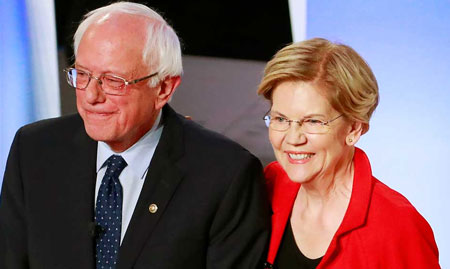
Similar goals, different strengths
Three, count 'em, three states have held nominating procedures for the Democratic race for President. Two of those were caucuses, and the one that was a primary was effectively an open primary—very, very few people have yet had their say and New Hampshire allowed crossover voting. So of course this is the perfect time for everyone to FREAK THE FRAK OUT because Bernie Sanders is in the lead with 45 delegates. 1,991 are needed for nomination.
It's the nature of the system that early contests have ridiculous influence over the whole process. It's basically insane that this is the stage that could really truly determine who's viable and who isn't, but for now, anyway, it's the reality we live in. And the conventional wisdom among the punditry, for what that's worth, seems to be that there are too many candidates still standing to avoid a Bernie Sanders nomination through non-majority plurality.
I don't know if I buy the details of that conventional wisdom, but the broad strokes are troubling to me. Under normal circumstances it might just be a curiosity or a mild irritant, but circumstances are so far from normal I find I am very close to joining the freakout.
Don't get me wrong, I like Bernie Sanders when it comes to policy, in large part. Not entirely, but in large part. But I fear him as a general election candidate. That might be unfair, that might not stand up to thorough examination, but it's still there. I do not want him to be our nominee for a number of reasons, chief of which is that I am afraid the Republican propaganda machine will succeed in opposing him in a way it would not in opposing the other candidates. The Trumpers will paint him as a very different kind of socialist than he actually is and in too may people, it will stick. His failures to support sanctions on Russia are curious and those will be weaponized (incongruously, but still). His lack of specificity on how to finance his grand visions will be used to tar him as a fantasist (again without acknowledging the rank hypocrisy of it). His sort of unpleasant grumpy personality could work against him too. His health is in question and he's being a bit too secretive about it.
On the other hand, Sanders is energizing a voting bloc that we need—younger voters, a group that historically has been apathetic. Pro-Bernie advocates have argued that those new voters will (a) not support anyone else, and (b) will outnumber any groups that defect. Maybe.
I just don't want to risk it. Elizabeth Warren is my candidate of choice, as I've said before; I think she's a far, far better candidate not just in terms of policy but in terms of inclusiveness and attitude and ability to actually make progress, and she should be as attractive to those young voters as Sanders is (if they were to pay attention, which is far from certain). I know a couple of people that fear her as the nominee because of sexism (not theirs, but their perception of the electorate), but I think she's on pretty solid footing there. She's tough in a way that doesn't offend (at least, doesn't offend people that don't oppress other people) and she has more chops when it comes to fighting corruption—which, aside from preventing tyranny, should be either the number one or number two issue in this election, along with climate change—than anyone else by a long shot. Joe Biden is a troubling candidate because of how he presents himself and a kind of out-of-touchness he seems to embody, but I'd be fine with him, I think he could cut it. Klobuchar isn't a viable option, but I'd be OK with her too, if not super jazzed. Mayor Pete is evidently a super-smart guy, but I want him to get some more experience before jumping all the way from mayor of a modest city to president; still, I'm OK with him too. None of them seem nearly as risky as Sanders in the general, and all of them would probably have more success after becoming president.
Even if he were to win, I don't see Bernie getting very much accomplished. He has fine goals, but getting them done will take a lot of work and he's short on allies in Congress. He still won't join the Democratic party. He would have to become a Democrat by requirement if he were to win as the party's nominee, but he's stubbornly refused so far, which isn't exactly a problem but also seems a bit...off-putting? To congressional leadership, I mean (mostly). Again, Warren seems like a much better choice for making actual progress. Much better. Many of these younger Bernie devotees could end up jaded and disillusioned if he wins and doesn't get Medicare for All and free college passed into law in four years.
But in the grand scheme of things, I'd be happy to have to address that problem—right now the crisis is getting this tyrant out of the White House and restoring democracy and the rule of law to this country.
Bloomberg can go to hell, he's probably the worst guy we could put up. But Sanders makes me nervous and I don't want to nominate him either.
Go Warren.
No Comments yetBut is it Star Trek?
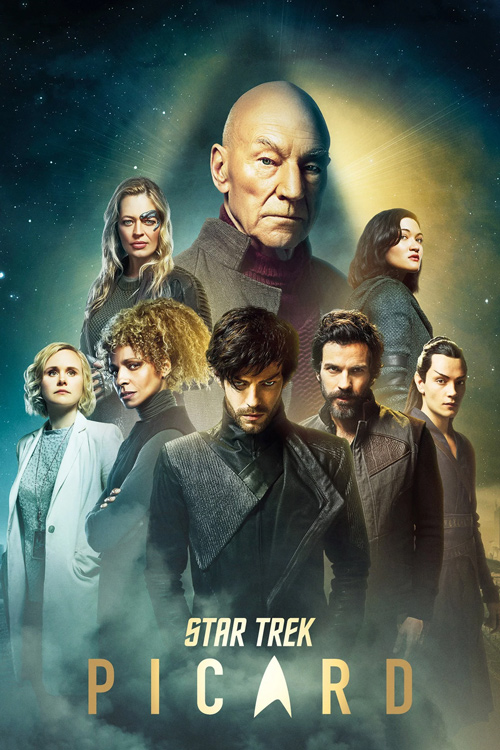
Last month the latest Star Trek series premiered and, naturally, I have thoughts.
Like the other currently-in-production series, Star Trek: Picard is a streaming-only, online-delivered product doing its part to make Lt. Cdr. Data's declaration that television as we've known it will only last until about 2040 come true. To save ourselves a bit of coin, some friends and I get together to watch episodes here, depriving CBS of several individual subscription fees. (They're doing OK, though.)
There is a difference of opinion about this show. Both in my Trek Night posse and in the wider culture. Some, even, in my own head. It's a complicated production. By and large it seems accepted that the show is a good piece of sci-fi, but does it rise to the level of Star Trek?
It's the same criticism that Star Trek: Discovery gets. On Discovery it's a more understandable complaint. They chose to play fast-and-loose with established canon in a prequel series and had to do some damage control on it; they canned the initial showrunner, Bryan Fuller, who is a huge fan and knows his Trek, and gave it to Alex Kurtzman, who, fairly or unfairly, has the taint of J.J. Abrams on him from their collaboration on the feature films Star Trek (2009) and Star Trek Into Darkness, both of which were decidedly not up to Trek standard and the latter of which is a truly awful piece of work; and while the correctives in the second season were welcome, the show still has a bit of a doom-and-gloom aspect to it that rankles when the Star Trek future is supposed to be positive and hopeful. I still like it, lots of stuff there is good, and with year two I do think it counts as "real Star Trek."
Kurtzman is in the mix on Picard as well, but the writing staff here is led by one of my absolute favorite novelists, Michael Chabon. Someone who knows how to write and craft a story, someone who respects the Trek legacy, someone who knows about building characters. So already Picard is way better than Disco in some basic structural ways. But is it Star Trek?
I say yes, though I see some validity in the counter-arguments. In Picard, the story suggests failures on the part of the generally-utopian United Federation of Planets, hints at conspiracies to undercut the values our heroes are supposed to embody, and there's great disillusionment with the noble Starfleet organization that has been home to Trek heroes prior. And—in stark contrast to Star Trek: The Next Generation—it features characters that are deeply damaged: Raffi's conspiracy theories drove her family away and drove her to addiction issues; Rios had an as-yet-unspecified Starfleet experience that gave him some form of PTSD that left him a bit fatalistic; Picard himself has been nursing an outrage that damaged him; and Agnes...well, she's profoundly guilty about something and has probably been victimized by a Romulan spy. Even one of our villains seems to be conflicted to some degree. There are also relatively minor things that seem a bit "wrong," with references to individual wealth and Rios lighting up cigars here and there. (Nick Meyer may have thought smoking was a thing in Star Trek, but in that respect he was an idiot.)
But Star Trek has always been a vehicle to reflect issues of present-day society in a science-fiction wrapper. We had allegories to topics including the Vietnam war, segregation, and birth-control in the late ’60s; species extinction, ozone depletion, drug abuse, and traumatized veterans in the ’80s; glaznost, homelessness, gay acceptance (sort of), and terrorism in the ’90s; and a rather heavy-handed 9/11 reflection in the ’00s. So why not have Picard reflect the troubles of today—the United States has lost its way and has withdrawn from the world and become more isolated, so having the Federation abandon its humanitarian (I'm sure the Federation has a better word for that that isn't speciesist) mission to aid the Romulans and institute overreaching new laws in the name of security could make for a fine story, depending on the resolution (still to come). And our heroes—Picard himself and his motley crew of misfits—are upset with this. Jean-Luc Picard is probably the single-most idealized character in Trek canon and though here in his later years he is a bit jaded it's largely because his culture is not fulfilling his idealism. He is still the embodiment of moral goodness even if the civilization around him is stumbling a bit.
Plus, political conspiracies are nothing new to Star Trek. The difference (so far) is that when they've been story points before they were resolved heroically and to the culture's benefit. Is there even a political conspiracy afoot in Picard? Undoubtedly so, but it's not yet been revealed, and when it is how will it resolve?
There's also been a bit of confusion in my group here about what all has been drawn from Treks previous and what has not; Picard uses a fair amount of canonical Trek as its foundational bedrock, but most of the characters are new. There's a lot of implied backstory that assumes you know this history and can use it to fill things in. (There's a prologue novel—The Last Best Hope, by Una McCormack—that spells out a lot of that backstory, but it's not a necessity, just a rich supplement.) For someone like me, that's a plus; I'm steeped in this world and know all the deets better than some real-life history I should probably be up on. But I can see where it might bug others.
I've also seen objections to the fact that some of the characters swear in Picard, which is a silly criticism, and to some of the gore, which is not. Frankly, I'm more perturbed by Rios' smoking.
I like the show a lot. Whether it lives up to the high ideals expected of it remains to be seen, that's the nature of a serialized story. But I have faith in Michael Chabon. And I recommend it highly.
No Comments yetVegas Debate Thoughts
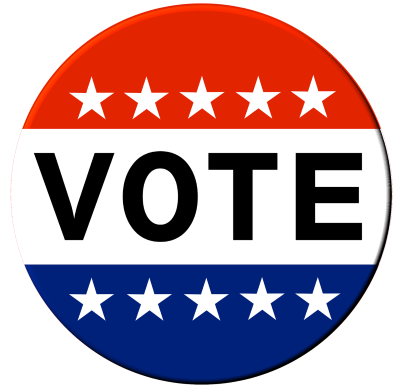
The Democratic candidates debate in Las Vegas ended a little while ago. I watched it along with my friend Mark and while he had a mostly negative reaction to it, I found it . . . not a positive development, necessarily, but at least rather interesting.
One thing that was a slight improvement over last time was the nature of the questions, but they still kind of sucked. Asking Sen. Klobuchar "Why didn't you know the name of the Mexican president?" was a lame question and well deserved the rebuke that Elizabeth Warren gave the moderator for it.
In no particular order, some thoughts:
- Sen. Warren didn't take my advice, but she did have a very strong performance. She opened by rightly bludgeoning Mike Bloomberg, who was vastly outclassed. Warren also jabbed at other candidates, some surprising (she name-checked Klobuchar a few times in criticisms) some not (Mayor Pete and his big-money donors), but more importantly showed her fire in championing Democratic principles.
- Mayor Pete was the only one on stage that kept his cool the whole time. The fire worked for Warren, the calm worked for Pete. Even under attack he was cool and collected and parried reasonably well. That said, his centrist health-care talking points remain specious and his characterization of Sanders' policies as "burn the house down" did not help him.
- Speaking of Mayor Pete, his heavy-mustache stubble made him look like a high school kid desperate to grow facial hair to look grown up.
- Bernie was Bernie. As Mark and I talked about, say what you will about Bernie Sanders, there's never any ambiguity with him. He came under some fire for the actions of some of his purported supporters, reprehensible behavior, and I have some sympathy for Bernie there; a candidate simply cannot manage all that people do online, and even disowning those supporters isn't going to matter there. Plus, some of that abuse is probably being done in the name of his campaign but by people whose only goal is disruption. Pete went after him for a failure of leadership that allowed this awful behavior, and OK, he's got a point, but how much of it is really controllable?
- The post-debate outcry over the truly inane question from Chuck Todd (WTF is Chuck Todd doing there anyway? He's a lousy interviewer) about whether or not the field should simply anoint the candidate with the most pledged delegates after the primaries are over even if they don't have a majority is maddening. You can't just have a simple blanket answer to that, the only reasonable answer is "it depends," which is essentially what all except Sanders said in response. That talking heads decry "it depends" as a shocking answer is absurd.
- I'm really curious to see what kind of fallout, if any, there is for Sen. Klobuchar after this one. It seems to me that she didn't help herself at all tonight and did not react well to criticism. She even said to Buttigieg, "are you saying I'm dumb?" which was not at all what he was doing. The hostile defensiveness may not play well. I admit I don't know how much of that might amount to sexist double-standards. Dudes can be nasty and get away with it. But I think this was something else. I'll be surprised if she doesn't lose support.
- There was not NEARLY enough talk about Trump. Especially in light of the continuing presidential crime spree and his spate of pardons this week, all of the candidates needed to direct their venom more in his direction and there just wasn't much there. This is on the moderators as much if not more than on the candidates themselves.
- There was some back and forth on the "socialism" label that Sanders has made part of his identity. Most of what was said was stupid—especially from Bloomberg, who basically said anything other than unfettered capitalism was "communism"—and some opportunities for clarity were missed. Pete at one point invoked Denmark as the place in the world one is most likely to achieve "the American dream," but here was critical of the concept of socialism. That was a contradiction that begged to be highlighted and no one mentioned it.
- Still way too much time spent on health-care policy. Yes, it's important, yes, some are better on this than others, but there are bigger fish to fry here and the moderate position always warns against "taking away" insurance plans that "people love." Well, if anyone really loves their insurance plan they probably don't love the premium. No one will shed a tear if they lose a private insurance plan that they don't like/pay a fortune for and in its place get simple universal coverage that covers them fully at lesser overall cost. Unless you have Bloomberg money, in which case it might cost you a little more, but you have Bloomberg money, so it won't bother you. The moderate argument is specious. If you want to restrict your argument against single-payer to Federal budget constraints, OK, that's valid, but don't bullshit us about being able to keep our shitty for-profit insurance.
- Pete pointed out that neither Sanders nor Bloomberg are actually Democrats. Nice. That's a concern for me with Bernie; if he's President, will he be leading the party? He's running in the Democratic primary, but he's still an independent and will not become a Democrat. Bloomberg left the Republicans and good for him, but as Mark pointed out, he didn't change—his party left him, he still has the positions he had when he called himself a Republican.
- At one point when discussing health insurance, Warren began telling an anecdote about being in Reno and for just a second I wondered if she was going to channel Johnny Cash and say she saw a man in Reno and watched him die. (She didn't.)
Some post-debate favorites from my Twitter feed...
Bloomberg saying he can't release women from NDAs because they were signed consensually probably sounded better when he tested it on the flunkies he pays to be living furniture in his skyscraper penthouse.
— Just Plain Tom Tomorrow (@tomtomorrow) February 20, 2020
Saying "I worked very hard for it" to justify your position as a billionaire is one of the most absurd things I can imagine when there are people working multiple jobs who still don't make enough to feed their children and pay their rent.
— Clint Smith (@ClintSmithIII) February 20, 2020
I think Warren is a Rorschach test as much as she is a candidate.
— Annie Gabston-Howell- (@AnnieGabstonH) February 20, 2020
There are folks--like me--who love to hear her laying in to the rest of the group. There are others who think she's "too much" and should be less feisty.
I suspect it has to do with our expectations from women.
Debate moderators did a disservice to Americans by failing to mention alarming issues.
— Alexandra Chalupa (@AlexandraChalup) February 20, 2020
Our nation is in a crisis. Today, Trump said he will install a loyalist w/ Firtash ties as DNI. He’s pardoning corrupt criminals. The head of the DOJ threatens the rule of law. Yet silence.
Tonight was like watching Bloomberg’s first day in the prison yard and Warren immediately making him her bitch. #DemDebate
— Larry Wilmore (@larrywilmore) February 20, 2020
Bloomberg brought a wallet to a knife fight.
— Bruce Mehlman (@bpmehlman) February 20, 2020
Better question is whether Chuck Todd should exist. https://t.co/N39os5C2m6
— Karoli (@Karoli) February 20, 2020
Feels like if your parents were bad, Warren would be the grandma who raised you and your siblings while working a full time job and then hit your dad in the face with a 2x4 if he showed up drunk when you were taking prom pictures on the front lawn, this may be too specific
— Sara Benincasa (@SaraJBenincasa) February 20, 2020
Elizabeth Warren is channeling an inner fury that only comes from grading papers that have no thesis statement.
— Curtis Harris (@curtismharris) February 20, 2020
Pete: You should probably know about Mexico you're on the relevant committee.
— Tommy Vietor (@TVietor08) February 20, 2020
Amy: Did you call me dumb? Your haircut sucks. Fuck your ugly tie.
Listen, some pundits may say that it was unsporting for Elizabeth Warren to kick off this debate by ripping Mike Bloomberg’s arms off and using them to punch him in the dick, but i respectfully disagree
— andi zeisler (@andizeisler) February 20, 2020
Warren is dominating this debate, but the socialism vs. capitalism section is a reminder that she's never really figured out how to message her distinctiveness here: she wants to save capitalism from the capitalists.
— Ezra Klein (@ezraklein) February 20, 2020
apologies for the superficial observation but chuck todd looks like he cuts his own hair
— Just Plain Tom Tomorrow (@tomtomorrow) February 20, 2020
The Democrats, live on TV,
— Limericking (@Limericking) February 20, 2020
Debated which issues were key,
& Liz, teaching class,
Handed Mike his whole ass,
A thing that we all love to see.
Comments Fixed
It was brought to my attention that the comment feature on this site was not working properly. Oops. There was some alteration to the server setup during my time neglecting the blog. Fixed now! Comment away!
No Comments yetDebate Strategy
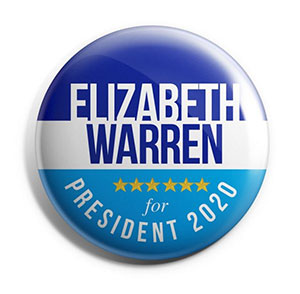
In advance of tomorrow night's Democratic candidates debate in Las Vegas, I have concerns. My preferred candidate, Elizabeth Warren, is getting the shaft from the media—even to the point of being omitted from head-to-head questions in a major NBC News poll today—and needs to gain some traction. Writing anyone off after just 1.5% of delegates have been allotted is absurd, and as noted before, the system that requires fundraising to be contingent on results in two tiny whitebread states is in dire need of reform. That said, Warren still has the third-most delegates and is behind a very polarizing candidate and an untested moderate that is very much a dark horse in the race. Not that you'd know it from the media stories of late.
So the senator needs to make a splash tomorrow, get the attention of the cameras and the journos as well as, of course, the voters. Here's my open letter of advice.
Dear Senator Warren,
As you know, we need to beat Trump in November. Soundly. Overwhelmingly. We need as much voter turnout as we can muster. I believe you're the best candidate in the field to accomplish that for us, and I think that should be a principal line of attack in the next couple of debates.
Don't get me wrong, I love the policy positions and I think those should be in the conversation, but some focus on the ones that relate directly with the Trump crime spree would be welcome. Bickering about health care policy isn't going to do the trick, even though yours is the best-articulated plan for that.
No, let's focus instead on your proposal for the Office of Public Integrity, a new agency to monitor and review executive branch actions for illegality. Let's focus on the law and the upholding of the law, let's give some time to the view that the heretofore accepted practice of not going after previous presidents (e.g. Ford pardoning Nixon and Obama not supporting action confronting war crimes committed by the George W. Bush administration) cannot apply in the case of Trump or anyone in the future who might try to turn our democratic republic into a tyrannical autocracy. One might go so far as to argue that pardoning Nixon set a bad precedent that helped lead us to the crisis we are in today. Let's focus on your anti-corruption proposals and bona fides, particularly in light of Trump's latest spate of pardons and commutations for financial criminals. The anti-conflict-of-interest provisions of your proposals seem pertinent in light of all this, though they have weight regardless given the plethora of Trump emoluments violations.
The top issue for all of us in this election is beating Trump. I mean, there's no more United States as we know it if we don't. But there's a divide within the anti-Trump electorate, with a disturbing number of voters who say they support Bernie Sanders but will not support anyone else; a contingent that insists on sweeping change butting heads against a contingent that fears overreaching; a media environment that is beginning to push a false Bernie-vs.-Bloomberg narrative.
You are uniquely positioned to appeal to the most voters. All respect to Mr. Sanders, among the candidates you are easily the most antithetical to Trump and Trumpism. Your policy positions are at least as appealing to those that support Mr. Sanders as his are, and you don't have the baggage of (a) the "Bernie Bro" army that offends and alienates all over social media; (b) the easy target of "socialist" that Banana Republicans will exploit against Mr. Sanders (though to be fair, they will make up scandal about any of you); or (c) the lingering bitterness from the 2016 primary cycle. None of the other candidates are likely to have as easy a time incorporating the Sanders support into a general election movement. Further, your experience and temperament are more appealing to many if not most than the youth, inexperience, and centrism of Mayor Buttegieg; the awkward speechifying, seemingly obsolete view of Republicans, and odd defensiveness of Vice-President Biden; the moderation from Senator Klobuchar; and the disturbing history of racism and moneyed bias from recent Republican Mr. Bloomberg.
Frankly, if logic were the sole basis of support, you'd be running away with this. But even with personality and emotional relativity seeming to be more important, your agenda is well-suited to such appeals and your ability to connect with people one-on-one should be a strength.
One more thing: When I worked on John Kerry's campaign in 2004, the thing that drove me up the wall more than anything else he did was speak on the campaign trail and in debate forums with the sort of language that works in the well of the Senate but can turn off people in other contexts. For example, he'd do the Senator thing of beginning sentences with "Look," and then make his point, but tonally that always sounded condescending, as if there was an unspoken "you moron" after "Look." You've done this same type of thing, and I urge you to be aware and maybe modify that kind of verbiage.
Good luck in the debates. I'm hoping for a great run of press afterward. :-)
No Comments yet#FireManfred

You will never convince me that Rob Manfred likes or watches baseball.
— Julie DiCaro (@JulieDiCaro) February 10, 2020
It's small potatoes compared to the existential crisis of Republican totalitarianism, but today the commissioner of baseball held a press conference and I have opinions about it. See the deets at my other site.
No Comments yetLarry Wilmore, National Trasure
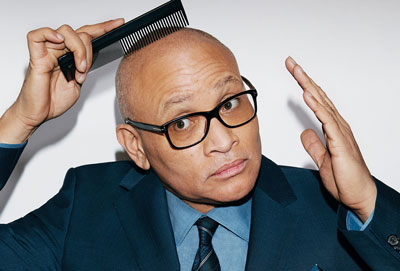
Larry Wilmore
I listen to a lot of podcasts (most political, some not), and tonight on my walk around the neighborhood in the Seattle mist I was listening to Ronan Farrow's boyfriend's weekly pod, "Lovett or Leave It," which featured guest panelist Larry Wilmore. Larry is one of those guys that I see occasionally on TV and think, "that guy is hilarious." Then I forget about him and move on. But Larry said a couple of things here that (a) led me to seek out his own podcast, "Larry Wilmore: Black on the Air," which I have not yet listened to but will add to my list of regular downloads; and (b) reminded me that Larry Wilmore is brilliant and should be not-forgotten when you move on from one of his hilarious appearances.
One of those things was just a throwaway reference to our current president, a moniker which I find perfect in every way and may start using in everyday conversation: "Tangerine Idi Amin." The other was a generous offer to Democratic presidential candidates regarding their, let's say racial insensitivities, capped off with the suggestion to "go skiing, do something really white, knock yourself out."
Here's a taste.
The Rule of Law is Broken
Ten minutes from Rachel Maddow tonight that I thought deserved some amplification.
Believe the Autocrat
The other day I cited Rachel Maddow as an exception in my screed about the failure of the news media to treat the Trump crisis as a crisis. This segment from her show earlier this week illustrates her difference.
Primary Directive
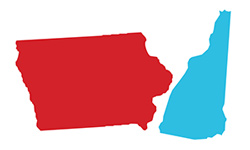
Warning: This post will likely be a bit of a disjointed ramble.
As a politics nerd, I spend a lot of time listening to podcasts and watching news reports and surfing news sites online. I'm a consumer of the "horse-race" coverage every time presidential or even midterm election season comes 'round. I am, thus, part of the problem.
Because when it comes to Presidents, our election system is . . . let's say, not optimal. And that's not even taking into consideration the crises of the moment, the real possibility that a foreign and domestic terror campaign is well underway to disrupt and delegitimize our democratic process with the goal of turning the USA into a banana republic. No, even if we set aside that nightmare for a moment things are a bit wack.
I suppose things are bound to get screwy when you build a system that evolves and changes in some ways over long periods while simultaneously not evolving or changing with external contexts. But here we are, primary season, and once again Iowa and New Hampshire are wielding power far greater than is remotely reasonable.
I've been hearing several wonks on news shows and podcasts speculating on who should drop out of the race, who now has a shot, who connects with what demographic—all based on the results in two tiny, near-homogeneous states that combined account for about 1.5% of the available delegates. With 98.5% of delegates still to be allotted, people—even George Takei, in a since-deleted tweet! George, my man, you are wrong here!—are saying anyone who finishes worse than third in both Iowa and New Hampshire should drop out. People are calling on the so-called moderate candidates to consolidate themselves into one, with two of Pete Buttigieg, Joe Biden, and Amy Klobuchar dropping out to throw support to the third in order to prevent Sanders from winning with a small plurality. I hear others decrying the proportional-allotment system, advocating for a winner-take-all primary setup like the Republicans have. All sorts of complaints and theories and advice based on two tiny near-homogeneous states representing one-and-a-half percent.
It's about money, of course. Candidates need to keep raising money unless they're Bloomberg-like gazillionaires, and a poor showing in the first and/or second state can hurt that. Do well in one or both and you can get more donations. Or, more accurately, have it reported that you did well or poorly and you can get more/not get enough donations. Because the media drives this as much or more than the actual voting does. And we consumers of media reinforce that behavior, thus part of the problem.
What's the fix? (Presuming that we still have presidential elections after 2020, of course, and that they are once again more-or-less legit.) Is it a national primary, everyone votes the same day? Is it bunching a few more states up front with Iowa and New Hampshire, or maybe pushing things so nobody is close to those two? Is it just mixing up the order of who goes when so different states get the power IA and NH have now each time? Go back to using the party convention as the principal venue for choosing a nominee?
One change that would go a long way to improving everything in our electoral system would be mandating public financing, take the billionaire factor out of things and relieve the fundraising pressure on individual candidates.
Another thing I'd change would be the concept of open primaries. Those should go away. I know that would be unpopular in some circles, but they make no sense and are invitations to ratfuckery. And New Hampshire has an open primary, another reason its power is sorely misplaced. Trump and his cronies invited their supporters outright to vote for "a weak" Democrat in the New Hampshire primary in order to disrupt the Democrats' process. Even without prompting from your cult leader, one could make a calculation to cast a strategic primary vote for your preferred opponent in the general election. Regardless, these are party primary elections/caucuses. To determine your party's nominee. If you do not belong to that party, should you really have a say in who they nominate? I think not. We in Washington also have an open primary now; we don't even allow party registrations. I get wanting to have as much voter participation as possible, I appreciate that concept. And it absolutely applies to general elections. But if you have a club or organization, and need to nominate a leader for it, do you open that up to people not in your club or organization? No. So why are Republicans and independents allowed to vote for who the Democratic party nominates as their candidate? Democrats should vote in Democratic primaries and Republicans should vote in Republican primaries and Greens in Green primaries, if those ever become a thing, and so on. And if you're keen on being an independent, well, sorry, but you get no say until the general election. I know, it's largely symbolic; one can change one's party affiliation whenever, but it irritates me to see, for example, that 43% of people who voted in the New Hampshire Democratic primary were not Democrats:

I do, however, support keeping proportional allotment of delegates. Leave the all-or-nothing, I-got-mine-you-get-nothing-sucks-to-be-you attitude to the Republicans.
No Comments yetWake up, News Media
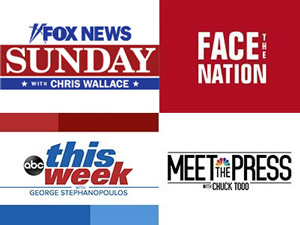
I am really curious, and really pessimistic, about how the network news shows and principal print press are going to handle President VonClownstick and his enablers going forward.
Three years into this nightmare administration and Chuck Todd is still asking milquetoast questions on Meet the Press and Margaret Brennan is still letting Republican Senators and administration officials walk all over her on Face the Nation. (How Stephanopolous is doing on his show I don't know, but based on his performance in last week's debate I have to think he's asking dumb questions too.) Now that POTUS has gone full-on dictator with his consigliere henchman Bill Barr, taking revenge on those who dared testify under Congressional subpoena and using the Justice Department (which really will need a new name) as an arm of the Trump Crime Family, will reporters change their ways? Will they start confronting enablers of autocracy on their overt and covert abetting of an insane clown tyrant?
I have my doubts. The outrages we've already lived through seem like plenty to light a fire under the press and, with some very notable exceptions*, they still cower. The President of the United States has called our free press "the enemy of the people" and decried all truthful reporting as "fake news," he is (and has been for years now) employing Russian-style propaganda tactics, spewing misinformation at a truly astonishing rate, and has somehow conned or coerced the entire Republican Party (what remains of it) into helping him bring down the country; even during impeachment reporters basically gave these people a pass.
I've noticed a small change since the impeachment show-trial; Brennan was tougher than usual when interviewing Sen. Lindsay Graham (R, Ninth Circle) last Sunday, though not nearly enough. Todd was better with Sen. Lamar Alexander (R, Bizarro-world) a week prior and got him to admit he thought Trump was guilty but would let him off anyway, but failed to sufficiently press the point to confront Alexander with the hypocrisy of his vote. Baby steps, I guess.
But baby steps are too little too late, this is crisis time. The Republican party writ large is trying to discredit the press in its entirety. STOP LETTING THEM.
* The MSNBC prime time trio of Chris Hayes, Rachel Maddow, and Lawrence O'Donnell are doing very well, but they are considered, rightly or wrongly, as biased because of the Republican narrative that MSNBC is "liberal." Anderson Cooper has likewise stepped it up of late. Washington Post columnists like Gene Robinson and Atlantic Magazine writers like David Frum (a conservative!) are solid, but these are analysts rather than straight reporters. The news needs to be frank, direct, call out lies and propaganda, and treat this political era with the gravity it requires.
No Comments yet

